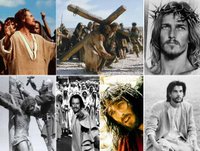 I just came across an article on Jesus films by S. Brent Plate, editor of the book "Re-Viewing the Passion: Mel Gibson's Film and Its Critics", which featured a chapter by Peter Chattaway.
I just came across an article on Jesus films by S. Brent Plate, editor of the book "Re-Viewing the Passion: Mel Gibson's Film and Its Critics", which featured a chapter by Peter Chattaway.Plate makes a number of interesting points, so here are a few excerpts:
I think it’s time to stop having biblical critics tell us about the real Jesus.
Don't get me wrong, some of my best friends are biblical critics, but I'm quite sure they would agree that a historically accurate Jesus only gets us so far. There is never only one. The problem with this historical rubric, as with so much of current U.S. political conversation, is that it all boils down to one singular correct view, and we are each either a winner or loser...Such either/or theological and political discussion reduces the great complexity of these issues, and few seem willing to stop and wait and talk it through and realize that truth may be richer, more multifaceted, more messy.
In other words, the reason we keep getting more and more Jesus films (the varieties are now as old as cinema itself) is that Jesus is never just one thing. The fundamental paradox is that Jesus becomes historical only and when people from various times and places can find a particular and personal relation to this figure in their here and now. For Christians, historically in the past and in the present, Jesus is not reducible to a one-dimensional object situated in the past, and the variety of Jesus films in the past 100 years shows how this might be true. How people saw Jesus in his day was quite varied, which is why early Christians retained the radical idea of authorizing four different versions of the life of Jesus: the gospels of the New Testament.
[snip]
The plurality at the heart of the Christian story is best understood in contemporary times through the plethora of Jesus films. But what is needed to make sense of this Jesus, these Jesuses, on Holy Week re-screenings, are a panel of experts who range from art history to film studies to Christian theology to religious studies to biblical criticism. Such a range would get us to realize the multifaceted dimensions of the mythologizing process.
 I'm not sure I quite agree with all of this, but certainly Jesus films viewed hand in hand with the biblical texts and a growing knowledge of the historical context in which they were written is a more powerful combination that with just the texts and history alone. Films about the Bible in general, and Jesus in particular force us out of our own perspectives, and make us see the events through someone else's eyes. This is crucial for eliminating our own historical / spiritual / academic / denominational / religious blindspots. We may of course reject the perspectives of those films, particularly in the light of our knowledge of the gospels and history, but from time to time they will also give us a sufficiently new perspective to enable us to see something for the first time. But like the plurality of the four gospels we need to guard against one or two films dominating our perspectives, particularly given the power of the medium of film.
I'm not sure I quite agree with all of this, but certainly Jesus films viewed hand in hand with the biblical texts and a growing knowledge of the historical context in which they were written is a more powerful combination that with just the texts and history alone. Films about the Bible in general, and Jesus in particular force us out of our own perspectives, and make us see the events through someone else's eyes. This is crucial for eliminating our own historical / spiritual / academic / denominational / religious blindspots. We may of course reject the perspectives of those films, particularly in the light of our knowledge of the gospels and history, but from time to time they will also give us a sufficiently new perspective to enable us to see something for the first time. But like the plurality of the four gospels we need to guard against one or two films dominating our perspectives, particularly given the power of the medium of film.
No comments:
Post a Comment